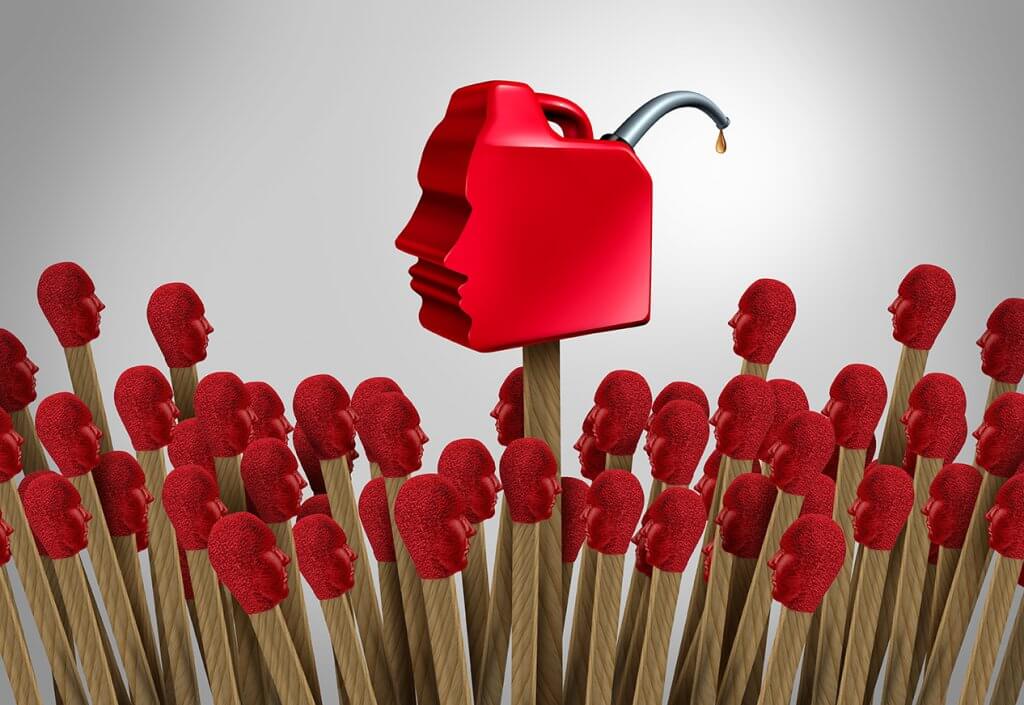Modern psychological dictionary from A to Z

What has previously only been encountered in psychology textbooks has firmly entered our lives. Premiere Magazine has compiled a dictionary of important psychological terms that define the life of people today. In a nutshell, we will talk about issues such as abuse and gaslighting, Karpman’s triangle and victim’s syndrome, Zero Waste awareness and philosophy, body positive and feminism.
Abuse
Articles about domestic violence have become more frequent in recent times. It is in this context that the word “abuse” is most often used – physical, financial or emotional abuse. The danger is that the condition can last for years, and it is difficult to prove, because the victim is told that she is to blame or that she has imagined everything. This affects mental health deeply, and hardly anyone succeeds in getting out of a co-dependent relationship without loss. Abuse is found not only in the family, but also, for example, in team environments or in supposedly friendly relationships. It is no coincidence that employers try to ensure an emotional climate is maintained at a proper level in order to avoid pressure being exerted on a particular employee.
Body positive
The world seems to have split in two. Some consider body positive (accepting their body at any age and with any form positively) a healthy attitude, while others consider it a temporary trend, conniving against their own health. It is important to recognize one thing – the standards of beauty have changed, and now everyone can be beautiful and the model body parameters of 90-60-90 are absolutely not needed.
Burnout
Each of us encounters a huge amount of information every day. Often it is too much to absorb. Our energy-intensive lifestyles, where so many things need to be done today, create constantly stressful situations. All this leads to emotional burnout. Background music in a cafe or driving a car can make us feel tired without even realizing it. Burn out is easier to prevent than to treat. The standard advice is to make time for yourself, so you can reboot and recharge, and to keep a close eye on the notorious work-life balance.
Gaslighting
Mass-market psychology literature has firmly settled on the shelves of bookstores, so now everyone is more or less aware of how important it is to defend personal borders. Caring for peace of mind, we try to prevent emotional blackmail and excessive criticism. Those who do not make a strong stand for themselves can be subjected to gaslighting – psychological manipulation – by which the perpetrator attempts to make them doubt their own interpretation of events or beliefs. The term was first used in Patrick Hamilton’s 1938 play, “Gas Light” (and subsequent film adaptations in 1940 and 1944), in which the protagonist changes things in their home every day and tries to convince his wife that she is imagining them and is going insane.

3D Rendering – Mind Field series. Backdrop composed of head of wire mesh human model and fractal patters and suitable for use in the projects on artificial intelligence, science and technology
Depression
Depression is a real scourge of our time, but should not be confused with apathy, “autumn spleen” or melancholy associated with weather conditions. According to the World Health Organization, this is one of the most common mental disorders and affects more than 300 million people. What to do? First, recognize the problem. Secondly, go to a specialist. It should be borne in mind that a psychologist or psychotherapist would only help in conjunction with a prescription for antidepressants. Therapists also talk about postpartum depression. In general, people no longer hide the fact that they go to therapy, have psychological problems or take pills. Because of this more open attitude depression is diagnosed much earlier than it was several decades ago.
EMDR
Developed by Francine Shapiro in the 1960s, eye movement desensitization and reprocessing (EMDR) therapy is a relatively new method in the field of psychotherapy for the treatment of post-traumatic stress disorders. The relevance of therapy is that the human psyche can block unpleasant experiences and traumatic events, which do not disappear, but instead pass from the realm of the conscious to the subconscious. In the beginning, this can be self-healing for a person, and then it is worth working out a psycho-traumatic situation.
Victim Syndrome
Victim Syndrome is a basic concept of psychology. A victim likes to shift responsibility for their life onto others and blames others for their own problems. The person does not accept advice and help, preferring to suffer further and demonstrate their weakness. Self-pity is a completely unconstructive feeling that must be fought. The psychological mask of the victim makes the person toxic, and the first thing psychologists advise is to work on self-esteem and take life into your own hands.

Female yoga figure in a transparent sphere, composed of four natural elements (water, fire, earth, air) as a concept for controlling emotions and power over nature.
Zero Waste
Zero Waste – life without rubbish – a relatively new movement of recycling and waste prevention. A few years ago, American blogger Catherine Kellogg decided to reduce garbage so much that it fits in just one rubbish container. The Zero Waste philosophy has several basic rules: refuse, reduce, reuse, recycle, rot. What can you do at home if you decide to live in accordance with this green trend? Do not buy extra items and products; refuse plastic dishes and paper towels. Across the world there are stores where buyers bring their own containers and products and goods are sold unpackaged by weight. There are even restaurants that adhere to the concept of Zero Waste. To get inspired, watch the movie “Racing to Zero, in Pursuit of Zero Waste”.
Intelligence
The IQ (intelligence) coefficient determines the mental abilities of a person. Recently, as a counterbalance to IQ, people began to talk more about emotional intelligence – EQ. Many important indicators depend on this coefficient – the ability to make connections, teamwork, successfully in dealing with stress, analysing one’s own mistakes, the ability to draw conclusions and make logical connections. Now, to be successful, it is not enough to have a high IQ: it is much more important to have self-discipline, perseverance and motivation. EQ is responsible for all this. The combination of these two indicators characterizes a mature, informed person.
Yoga
Only the lazy have not heard about yoga. Yoga is a series of physical exercises (asanas, to be exact), and spiritual practices that develop both the body and soul. There are many forms including hatha, ashtangavinyasa, bikram, kundalini, jivamukti, power yoga, yin yoga, Iyengar, anti-gravity and yogalates. Here is why you should practice yoga: gaining contact with the body, fighting bad habits, achievement of goals, harmony with oneself and the world, healthy sleep, good posture, improved digestion. Yoga can easily be added to your lifestyle and you don’t even need to go to specialized studios for this. Using a mat, YouTube lessons or apps, you can take up the pose of a dog, mountain or lotus without leaving your workplace or home.
Life coaching
Timothy Galvey can be considered the father of modern coaching, by the way. He was a real tennis coach. Don’t know what you want from life? Work doesn’t bring you pleasure? Is it difficult to stay where you are in life? A coach will come to the rescue, which – with the help of leading questions and various methods – will allow the client to quickly reach their goals. Coaching is fundamentally different from psychotherapy and psychology, but has become incredibly popular for its speed and effectiveness.
Leadership
Given that most of us are managers, there must inevitably be leaders. In the modern world, it is not enough to properly manage processes: you need to know how to function in constantly changing conditions. That is the prerogative of leaders. Whether innate or can be learned is still controversial. Leaders are responsible not only for the end result of the entire team, but also for the atmosphere and culture in which employees work. Business school, extreme sports and dealing with non-standard situations – all of these can improve the development of leadership skills and bring us closer to creating our own dream team.
Mindfulness
According to Google statistics, one of the most frequent queries is mindfulness. Indeed, the word mindfulness has already taken root in the Russian language. There are applications that develop mindfulness in us, make us calmer and more harmonious, enabling us to learn to enjoy the moment. For sceptics, there are plenty of studies online proving the usefulness of mindfulness meditation. The rest are happy to practice it in real life, trying to slow down and fix their attention on feelings, emotions and body. Otherwise, how do we survive in the modern world? Mindfulness has long migrated from yoga studios to educational schools, conferences and business offices.
Neurohacking
Over the past hundreds of years, man has almost completely subdued nature and even swung himself into space. Immediately after this, humanity wanted to control its own body. The term biohacking has come into use – hacking biological capabilities – this is an increase in productivity, and time of wakefulness, and even life expectancy. Almost immediately, the term neurohacking arose, that is, brain biohacking. Scientists conduct large-scale research and introduce a number of techniques to make the brain more efficient and productive. And if earlier it was believed that we use the capabilities of our brain only by 10%, now the paradigm prevails that its possibilities are endless, and how we use them depends only on us.
Awareness
It is no coincidence that mindfulness and awareness appear in one article. This is the way of life that we strive for if we want to be happy and fulfilled. Awareness is the choice we make daily, getting up in the morning – “To be happy or annoyed? To change your life or constantly complain? Strive for change, or be content with what you have?” It is awareness that most of the lectures given by psychologists are devoted to, relevant sessions are held, and Internet gurus post new articles. It seems that if it was necessary to have only one psychological term that reflects our time, it would be awareness.
Subconscious
“The subconscious can do anything” is a great motivational slogan. Since Freud, scientists continue to explore the possibilities of our subconscious. And if Sigmund Freud investigated unconscious motives, now the emphasis is on the fact that we can control our own subconscious. It is compared with an operating system that imperceptibly processes everything that happens in reality. It is from there that the brain receives a picture that forms our choices, feelings and aspirations. Modern neuroscientists are convinced that reality is subjective and depends on the perspectives of the observer. So, we can affect our own environment. Until recently, such a belief could only be found in a mystical magazine! Now it is confirmed by experiments, research and scientific data. It is no coincidence that interest in visualization, desire maps, affirmations, and other things that the subconscious can use has appeared.
Parent/child
This is not about the family context – mom, dad and child – but about the figures of the “inner parent” and “inner child”. In some situations, a person can act not as an adult, but as a child, or conversely, as a parent, in relation to themself. Similar scenarios (by the way, this is a form of adult games) were studied by transactional psychotherapist Eric Berne, author of “Games people play”. For those of us who have not received parental love, psychologists recommend nurturing the figure of “inner dad or mom”. To achieve inner harmony, one should adhere to a certain proportion of sub-personalities: 60% adult, 30% child, and 10% parent.

Gaslighting psychology as a social manipulating concept using psychological communication to destabilize as matches shaped as people with a dangerous gas cannister to fan the flames as a 3D render.
Self-realization
Since the time of ancient Greek philosophy, we have been trying to “Know who you are and be them”. But right now, self-development and self-realization are elevated to cult status. What does this mean? Each of us has a certain potential and a large number of opportunities. For the development of one’s self, it is important to show one’s abilities and prove things, first of all, to oneself. Self-realization should be considered as a life project with the understanding that the plan can be flexible. You can achieve career success, or you can make a hobby profitable. Perhaps the most difficult thing is to understand what you want to achieve.
Karpman Triangle
The Karpman Triangle or “Dramatic Triangle” is a popular model for the development of relationship dynamics. According to Stephen Karpman, people who have not reached psychological maturity play one of three roles – the victim, the aggressor or the persecutor. In different situations, the same person can take on a different role. The passive victim sincerely believes that nothing can be fixed. In addition, they do not want to change anything. With victim behaviour, the person attracts a persecutor who asserts themself at the other’s expense. There is also a lifeguard who is kind, empathic, and responsible. He is trying to increase self-esteem by helping the victim. More information about these roles can be found in Karpman’s book, “A Game Free Life.”
Success
Today is a time of approaching. Some people build a career, identifying themself with a profession, and devote themselves to office life. However, they can relinquish the latter in favour of downshifting and fleeing to an island in order to take on a new role there – to open a surf school or an eco-goods store. Success cannot happen without time management. More than ever, diaries are popular to manage multi-tasking.
Feminism
Feminism originated in the 19th century and is of course widespread today. The interpretation of the term in European countries and in Russia is different. So, if in Europe they fight for gender equality, in Russia it is for women’s rights. In general, feminism emphasizes that everyone is different and values individuality, while women should have the same political, economic and civil rights as men. Of course, biologically men and women are very different, but why should this affect wages? By the way, in Russia a man on average earns 25% more than a woman holding the same position. Despite all the achievements of feminists, the term often acquires a negative connotation.
Harassment
From American films, we know that harassment is when the boss pesters a subordinate. But the term is interpreted more broadly: it is not only sexual harassment, but also a series of acts that belittle a person – mockery, jokes, vulgar suggestions, and threats. Debate about harassment, the abuse of power and professional ethics has increased dramatically since Harvey Weinstein and other Hollywood stars made the news for all the wrong reasons.
Goals
The ability to set and achieve goals is the most important skill for every successful person. Increasingly it’s stated that goals should be conscious, and on the path to achieving them it is essential to remain in harmony with oneself. A huge number of life hacks have been developed to help people achieve goals. As examples, breaking a big goal into a number of small but manageable ones; congratulating yourself for achieving the next stage of success; not making a psychological dependence out of determination.
Challenge
Not so long ago, a challenge was a task that a user had to complete and post on social media. Remember the large-scale Ice Bucket Challenge, in which you had to pour a bucket of freezing cold water over yourself? It is in this context that the term came to the masses. Then it became fashionable to “challenge” oneself. Get up at 7 a.m. daily, learn a second foreign language, eat right, play sports – all these are challenges, especially if it is difficult for you and requires a lot of willpower to fulfil your plan. It seems that the challenge is a kind of New Year’s Eve Resolution. However, any method of becoming better is good, regardless of whether it is today, tomorrow or in the New Year. Getting out of your comfort zone is also a challenge.
Chauvinism
And while chauvinism was originally a national superiority, more recently the term has gained a wider meaning. Increasingly, you will find the expression “male chauvinism” in newspapers and magazines. In general, gender is still relevant – female discrimination, unequal rights and opportunities for both sexes. It depends on you and me whether the policy of double standards regarding men and women will change. And if in Europe the situation is being addressed, then in the East, women’s rights are almost the same as they were several centuries ago.
Generosity
It is fashionable to engage in charity. It is fashionable to remain silent about good deeds. More and more charitable foundations are appearing; newlyweds refuse wedding gifts in favour of donations to animal shelters; large companies transfer money to those in need instead of giving corporate gifts; schools ask students not to give flowers to teachers, but to help children instead. Charity is part of our civil society.
Environmental friendliness
The trend is to be eco-friendly and ethical in relation to the environment. Separate garbage collections, partial rejection of plastics (including cocktail tubes and cotton buds), energy efficiency – all this has become part of our daily routine. Some went further and travel in more environmentally friendly ways, use eco-cosmetics, visit eco-friendly restaurants and set green goals.
Jungianism
No article can adequately describe all the current trends of modern psychotherapy. Therefore, we dwell on one of the teachings of Carl Gustav Jung, which is again in fashion. Thanks to Jung, we are obliged to study archetypes. So, in each of us lives Anima and Animus, terms related to female and male, respectively. According to Jung, Anima is mood, Animus is opinion. For harmony, it is important to keep track of these unconscious projections. The doctrine of archetypes (Shadow, Persona), the collective unconscious, the importance of dreams and ancient legends – all of this we owe to Jung.
Self-concept
There is no doubt that the self-concept dominates in society. As never before the emphasis is placed on the “I”. “Who am I?” is an important question that every developed individual asks. “I think”, “I exist”, “I create” – any important paradigm begins with “I”. This concept is a person’s conscious idea of themselves; the ability to look not only at their own merits, but also at their own shortcomings. To get to know themselves better, people go to distant retreats, read relevant literature, and go to specialized master classes. In connection with this paradigm, the question inevitably comes around to self-esteem and of a certain image of the “ideal self”.









